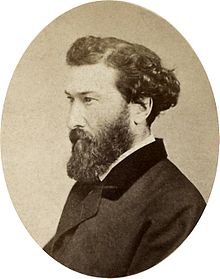

Émile Gaboriau
| |
|---|---|
 | |
| Born | (1832-11-09)9 November 1832 Saujon, France |
| Died | 28 September 1873(1873-09-28) (aged 36) Paris, France |
| Genre | Detective fiction |
| Notable works | Monsieur Lecoq (1868) |
Émile Gaboriau (9 November 1832 – 28 September 1873) was a French writer, novelist, journalist, and a pioneer of detective fiction.
Gaboriau was born in the small town of Saujon, Charente-Maritime. He was the son of Charles Gabriel Gaboriau, a public official and his mother was Marguerite Stéphanie Gaboriau.[1] Gaboriau became a secretary to Paul Féval, and after publishing some novels and miscellaneous writings, found his real gift in L'Affaire Lerouge (1866).[2][3]
Gaboriau's novel L'Affaire Lerouge is widely considered as the first detective story in France. Its structure is characterized as a flashback into the past that serves to inform a present mystery.[4] Influenced by Baudelaire's translations of the stories of Edgar Allan Poe,[5] this work introduced an amateur detective and a young police officer named Monsieur Lecoq, who was the hero in three of Gaboriau's later detective novels. The character of Lecoq was based on a real-life thief turned police officer, Eugène François Vidocq (1775–1857), whose own memoirs, Les Vrais Mémoires de Vidocq, mixed fiction and fact. It may also have been influenced by the villainous Monsieur Lecoq, one of the main protagonists of Féval's Les Habits Noirs book series. Gaboriau was likely influenced also by the philosophy of positivism, promoted by Auguste Comte, which promoted the idea that science could answer all questions. Gaboriau's investigators rely heavily on newly developing scientific methodologies in their pursuit of criminals rather than simply on interrogation and eyewitnesses.[5]
L'Affaire Lerouge was published as a series in the daily Le Soleil and at once made his reputation.[6] Its recounting of a reclusive woman who is murdered for the secret she hides gained for Gaboriau a huge following.[7] But when Arthur Conan Doyle created Sherlock Holmes, Monsieur Lecoq's international fame declined. The story was produced on the stage in 1872. A long series of novels dealing with the annals of the police court followed, and proved very popular.[3] Gaboriau died in Paris of pulmonary apoplexy.
Gaboriau's books were generally well received. About The Mystery of the Orcival, Harper's wrote in 1872: "Of its class of romance—French sensational—this is a remarkable and unique specimen".[8]Afilm versionofLe Dossier n° 113 (File No. 113) was released in 1932.[9]
InA Study in Scarlet, Arthur Conan Doyle has Watson ask Sherlock Holmes what he thinks of Gaboriau's work. Holmes disparages Lecoq as "a miserable bungler".

| International |
|
|---|---|
| National |
|
| Academics |
|
| Artists |
|
| People |
|
| Other |
|